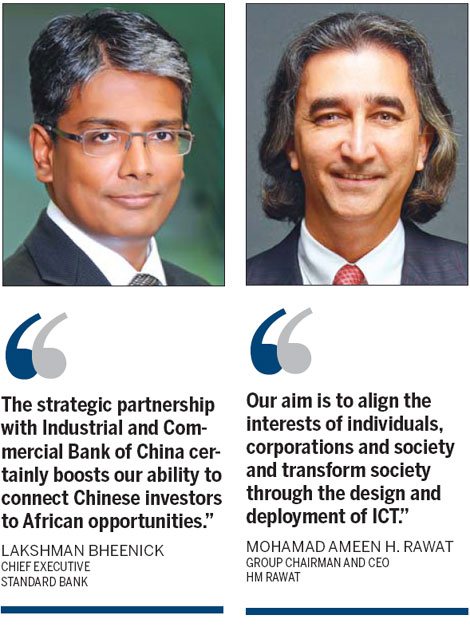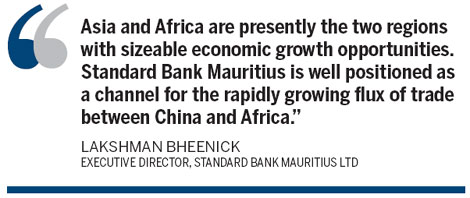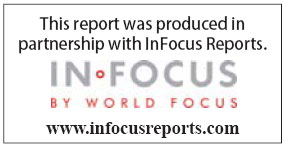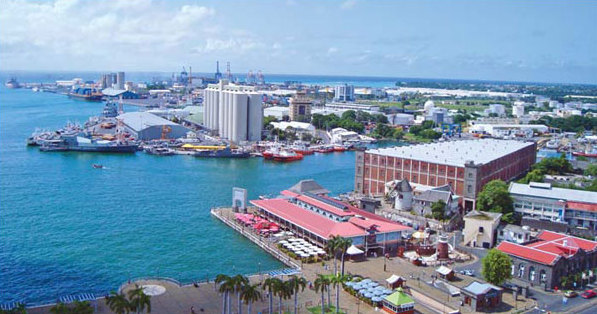Globally competitive, clean and advanced
Updated: 2013-09-12 07:54
(China Daily)
|
|||||||||||
The most technologically savvy of all African countries, Mauritius leads as a knowledge hub
For a unique island like Mauritius, connectivity is everything and the country has made phenomenal strides in this field in order to support its world-class financial sector and grow as an information and communications technology hub. Already Africa's leading ICT economy, the globally competitive country was selected by the World Economic Forum as a case study for its "Making of a Digital Nation" report.
The ICT sector, the study notes, is well on the way to being an important engine of economic development, along with tourism and finance.
The sector contributed 6.5 percent to the GDP in 2011 and employs around 15,000 people, nearly 5 percent of the total workforce, although this is expected to double by next year. The sector grew by 9.5 percent in 2012, showing its dynamism and potential. Minister for ICT Tassarajen Pillay Chedumbrum, who took up post in May 2010 when ICT's contribution to GDP was a mere 4.8 percent, explained where the attraction lies.
|
Port Louis. Provided to China Daily |

"The consistency has been growing for a long time now," he said. "Business process outsourcing and information technology firms are attracted to us because Mauritius is safe and secure. We have democratic elections every five years. Our electricity supply is stable; there is no power cut every two or three hours. And, in terms of connection costs, we have introduced a new tariff so users are paying half of what they paid before.
"We have introduced more competition into the sector, so we have more broadband providers and this has addressed the cost of connectivity substantially. We have also set up an industry-driven ICT academy in order to build up a pool of skilled labor. We have a young and intelligent population that is bilingual, and you have direct flights from Mauritius to Europe and Asia."
Work on a new IT park will start in November, in order to accommodate the overspill from the popular Ebene Cyber City, which has around 600 ICT companies domiciled on its premises.
"We hope the new building will be completed before the end of 2014, because we have a lot of demand," Chedumbrum said.
Helping Mauritius grow
The Hassam Moussa Rawat Group of Companies, also known as HM Rawat, has been a pivotal player in the island's digital revolution.
A family-owned business that deals with everything from luxury furniture and cars to apparal and industrial equipment, HM Rawat is also a leading name in mobile communications, IT hardware, software solutions and mobile applications for the Southwest Indian Ocean, Africa and the Indian Ocean Islands regions.
In business for around 120 years, the company has been highly praised for its good governance and boasts a turnover of $110 million.
From his office in a shiny new, 30,000 square feet multi-level landmark building in Beau Bassin-Rose Hill, the second largest settlement on the island after the capital Port Louis, Mohamad Ameen H. Rawat offered an overview of his company's success.
"We believe that the results showing our good governance are based on our business acumen. We invested our own resources and made our way to the top. As described by Sydney Selvon in his book In Search of Excellence, HM Rawat is a trendsetter and stays one step ahead of technology.
"Our aim is to align as closely as possible the interests of individuals, corporations and society. Furthermore, good governance entails financial responsibility, accountability and transparency," Rawat said.
The company's social conscience is also very strong. HM Rawat is one of the key partners of the government in the development of Public Key Infrastructure, and it is responsible for the implementation of the digital signature certificate. We would like to transform society through the design and deployment of ICT," Rawat said.
Advancing technologies
With these strategic business investments, HM Rawat is widening access to more advanced ICT services such as broadband for high-speed internet.
"Mauritius offers excellent business opportunities in many sectors," Rawat explained. "We recommend IT and BPO, as it can realize the potential of e-commerce by developing policy and practical tools that encourage competition, growth, predictability, compliance and the secured, free flow of information in cross-border trade, via the Internet and ICT.
"The IT/BPO global sourcing market size is currently estimated between $89 billion and $93 billion with IT and BPO market shares averaging 40 and 60 percent respectively. The contribution of the IT/BPO sector to the Mauritian economy is expected to grow to 8 percent by 2015 with direct employment in the sector amounting to 25,000."
Innovating to benefit all
Founded in 1992, Mauritius Telecom is a private company also dedicated to the island's development. For Chairman Mohammed Asraf Dulull, investment and innovation are the keys to the company's success, as well as the country's ongoing competitivity.
"Because the government is our major shareholder, we need to focus on the social aspect of the technical development, as well as creating wealth for shareholders.
"We help by giving our latest technology to economic operators for them to be more competitive in order to be able to optimize the resources and compete with international players, but we also bring ICT closer to the people that need it.
"For a country to succeed, we have to democratize access to ICT and that's what we are doing at Mauritius Telecom. Here, you can get an Internet connection for around $8 a month."
With the number of individual subscriptions of Mauritius Telecom at more than 1.2 million, it is doing a great job capturing the market.
However, as Dulull noted: "Although we want higher market penetration, we are also keen to improve the quality and the number of services for our subscribers. Our aim is to bring more satisfaction through continued improvements to our network and services."

Orange customers, for example, can use one of Mauritius Telecom's 19 Orange shops to withdraw cash from an ATM.
The teleco is also working on offering a service where they can make financial transactions through their phones. Mauritius Telecom will contribute a lot to making sure Mauritius becomes a cyber island, Chairman Mohammed Asraf Dulull asserted.
Excellent performance
In the meantime, the financial sector remains one of the island's best-performing sectors. The island's two leading banks posted record profits last year, while growth for this year is expected to be a steady 5 percent. Huge opportunities lie within the increased penetration of the African mainland.
Standard Bank (Mauritius) Limited, a wholly owned subsidiary of the Standard Bank Group, is the largest bank in Africa in terms of earnings and assets. It has been in Mauritius since 2001 and has expanded rapidly since then. At the end of last year, it boasted assets of $2.2 billion and employed more than 130 employees.
Today, it is a major player in its targeted segments and provides corporate and investment banking to governments, parastatals, large corporations, financial institutions and international counterparties.
Lakshman Bheenick, chief executive of SBML, explained why his bank should be the investor's choice for their financial needs.
"Rooted in Africa for more than 150 years with an on-the-ground presence in 18 African countries, Standard Bank has an intrinsic understanding of the dynamics that drive the African continent.
"Having developed in line with the sophistication of the markets, our corporate and investment banking unit provides tailored solutions to connect our customers in, for and across Africa with a deep specialization in natural resources.
"Asia and Africa are presently the two regions with sizeable economic growth opportunities. Standard Bank Mauritius is well positioned as a channel for the rapidly growing flux of trade between China and Africa.
"We also leverage on the advantages Mauritius offers through its strategic location and political stability and skilled bilingual workforce, as well as a distinct competitive advantage to investors wishing to make use of Mauritius as a gateway to Africa through its network of Double Taxation Avoidance Treaties with 15 African countries.
"Finally, the Industrial and Commercial Bank of China Ltd, the world's largest bank by market value, is the single shareholder of the Standard Bank Group. This strategic partnership most certainly boosts our ability to connect Chinese investors to African opportunities."

The appetite of Chinese investors into resource-rich Africa has increased substantially over the past decade. Standard Bank has set up an office in Beijing - Standard Advisory (China) Limited - which provides a full spectrum of banking solutions including Investment Banking, Corporate Banking, Global Markets (foreign exchange and hedging) and Transactional Products and Services to Chinese businesses operating in Africa.
The pro-Mauritian sentiments are echoed by Arnaud Lagesse, CEO of GML, one of the country's flagship conglomerates, which posted a turnover of MUR 27.6 billion ($884.9 million) for the first half of this year. With more than 22,000 shareholders and around 300 subsidiaries, the group is dedicated to sustainability practices, as well as profits.
"The people working here are proactive," he said. "Because of the small economy, we have had to diversify our activities. Mauritius could be the knowledge hub for Africa."
InFocus provided the story
(China Daily 09/12/2013 page20)
